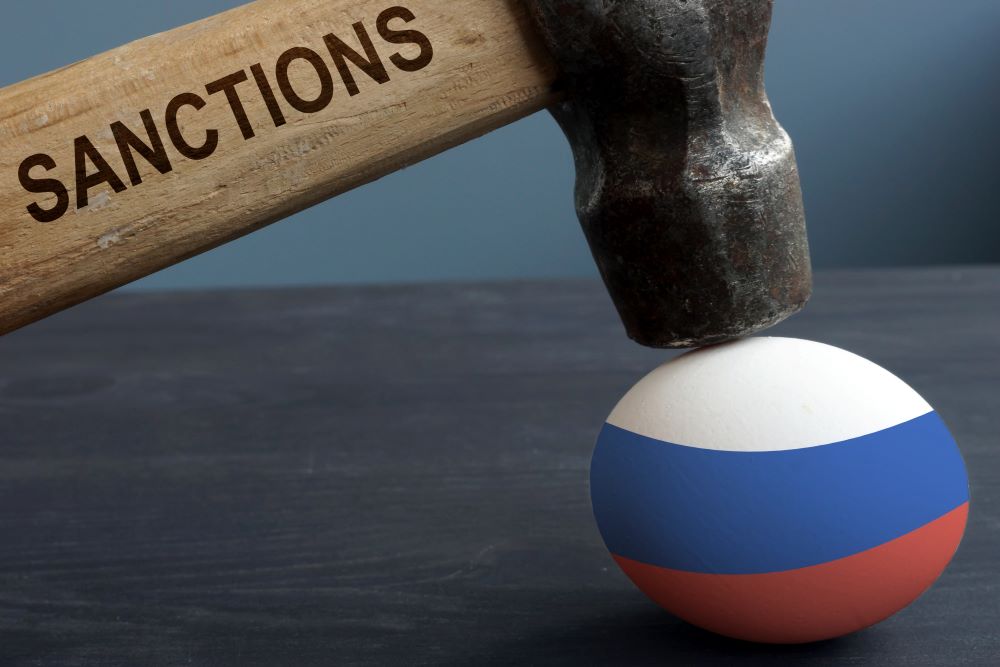
Foreign secretary Liz Truss has said that sanctions on Russia should not be lifted until all of its troops have left Ukraine.
Truss was speaking after meeting Ukrainian foreign minister Dmytro Kuleba during a trip to Poland yesterday to discuss stepping up sanctions, following reports and allegations of war crimes against Ukrainian civilians by Russian troops.
Strong words
The Guardian reports that Truss said sanctions had set back the Russian economy by 15 years but that more was needed.
“There should be no talk of removing sanctions, while Putin’s troops are in Ukraine, and the threat of Russian aggression looms over Europe,” she said.
“We need to see Putin withdraw his troops. We need to see Ukraine’s full territorial integrity restored. We need to see Russia’s ability for further aggression stopped.”
Further sanctions
The UK and EU are lining up further sanctions against Russia after Boris Johnson condemned “despicable attacks against civilians” as war crimes and said that Britain would step up sanctions and military aid in response, reports Reuters.
The US and France joined the call for a significant escalation of sanctions against Russia, with French President Emmanuel Macron urging a ban on Russian oil and coal imports. Macron has not yet called for sanctions on Russian gas as many EU members rely on it for energy.
EU executive vice-president Valdis Dombrovskis confirmed to reporters today (5 April) that the next wave of measures from Brussels will include restrictions on Russian coal and in the transport sector.
US President Joe Biden has proposed Putin be trialled for war crimes, according to the FT.
Alternative views
German economy minister Robert Habeck has discounted sanctions on energy, saying that a sudden import ban would harm the EU more than Russia.
He said the government would move to nationalise refineries and energy infrastructure owned by Russian companies in Germany.
However, Italy’s Enrico Letta, chief of the centre-left Democratic party, a junior partner in prime minister Mario Draghi’s national unity government, called for a “full oil and gas Russia embargo”, despite Italian reliance on Russia for energy, reports the FT.
EU sanctions
Existing EU measures include:
- a ban on seven Russian banks from the Swift payments network
- a block on exports in the defence, energy, telecoms and aviation sectors
- a ban on Russian airlines from EU airspace
- asset freezes against hundreds of individuals
New UK sanctions
Politico reports that the UK is likely to announce new sanctions this week and has been pushing the EU to agree tougher measures on energy, as well as closing ports to Russian vessels and goods, and further measures targeting Russia’s gold reserves.
The US Treasury said it would stop Russia from making debt payments in dollars through American banks, which could bring Moscow closer to default.
Green investment partners
UK trade minister Anne-Marie Trevelyan used a trip to Norway to meet renewable energy companies and press for “relationships with reliable energy partners like Norway to meet our needs, protect our supply chains and steady the global market”.
In a speech to a maritime conference in Lillestrom, Trevelyan said that the UK, USA, EU and Norway stood firm together on coordinating sanctions to reduce Putin’s ability to find diversionary routes.
Looking to the future, she said trade, investment, and partnerships between like-minded nations would eliminate Russian fuel and help the switch to sustainables.
“Across our economies, the more we trade and the more we invest, the more prosperous we will become, and we can use these gains to build a green economy that will eliminate Russian fuel from our energy mix once and for all,” she added.
3 other news updates from the crisis in Ukraine
- The World Trade Organization (WTO) has almost halved its global trade growth forecast for this year from 4.7% to 2.5% due to “the impact of the war and related policies”, reports the BBC
- According to the Yale School of Management, more than 500 companies have pulled back or pulled out of Russia
- The latest commodity to be affected by the war is sunflower oil, most of which is produced in Ukraine and Russia, reports the BBC
- Edible Oils, which packages oil for 75% of the UK retail market, said it only has a few weeks’ supply of sunflower oil left
Support
The IOE&IT continues to update British firms about the latest trade implications of the war in Ukraine.
You can view our recent webinar on compliance with sanctions, a tool to track the latest sanctions that have been imposed and links to relevant government guidance here.



